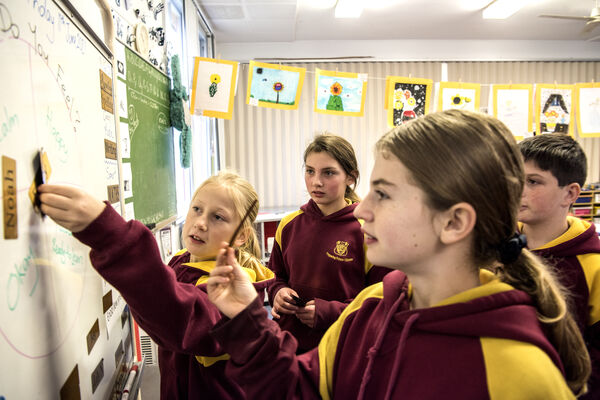Overview
Alignment with Be You Domains
-
Mentally Healthy Communities
-
Learning Resilience
-
Early Support
Alignment with Australian Curriculum
- Health and PE
Target audience
- Primary school
Target groups
- Whole class
Aims
Kids as Catalysts helps students develop skills to identify and solve real-world problems through creative and collaborative projects. The program aims to develop social awareness, leadership skills and community networks that children can draw on to lead positive change in their local communities. It also builds confidence, educational engagement, empathy, literacy, financial planning and creative thinking skills.Program theory
The program draws on the socio-ecological model of behaviour change to build resilience and leadership capacity in children.Topics
Topics covered in the program include: using creativity to explore personal values and rehearse key social and community development skills; building awareness and understanding of community issues; exploring alternative, positive pathways for communities in environments with few perceived options; and exploring creative ways to turn challenges and obstacles into opportunities for growth.Cost
Program structure
The 6-month program is delivered through direct training and self-directed, action-based learning over two school terms. Each school engages with the program over 3 years to facilitate scaffolded learning for both teachers and the children they work with.Instructor
- External facilitator
Instructor training
Instructor training can be completed over 2 to 3 days during a face-to-face workshop.Supporting resources or materials available with program
- Manual
- Workbook
Other materials
Video resourcesOngoing support
Kids Thrive provides experienced instructors for the program.Parent involvement
- Attend information sessions
- Written information provided to parents
- Online resources
Origin of program
Australia
Kids Thrive
Program authors
Dr Andrea Lemon, Andrea Rieniets
Ratings
Summary of evidence factors
This is a summary of the evaluation or research study characteristics that contribute to the program’s evidence rating.
|
Positive impact on at least one outcome for children and/or young people?
The study reported positive outcomes. |
Yes |
|---|---|
|
Link between program description and theory of change
Theory of change refers to whether there was a comprehensive description and illustration of how and why a desired change is expected to happen in a particular context. |
Comprehensive |
|
Study design
Type of study design reported. |
Pre-post cohort |
|
Independence
The degree to which the program authors were involved in the research. |
Semi |
Summary of implementation factors
This is a summary of the program’s characteristics that contribute to its implementation rating.
|
Feedback sought from participants
Participants enjoyed the program and understood its benefits. |
Yes |
|---|---|
|
Feedback sought from instructors
Instructors enjoyed the program and understood its benefits. |
No |
|
Groups program is not suitable for
Groups the program wouldn't be suitable for or that required further research to determine suitability. |
Not assessed |
|
Training provided during study
The model of training provided. |
Face to face train-the-trainer in person |
|
Ongoing instructor support provided during study
Whether ongoing support is provided. |
Yes |
Context
This is a summary of the context in which the evidence for the program was established.
|
Study Participants
Pre school, primary school (Foundation to Year 6), secondary school (Years 7 to 12). |
Primary school |
|---|---|
|
Country of Study/s
The location in which the evidence or research was conducted. |
Australia |
|
Location of Study/s in Australia
The state (or states) the program was assessed in Australia. |
VIC |
|
Evaluation of program in culturally and linguistically diverse populations
Provider has included culturally and linguistically diverse people when assessing the program. |
Yes |
|
Evaluation of program in Aboriginal and Torres Strait Islander children and young people
Provider has included Aboriginal and Torres Strait Islander peoples when assessing the program. |
Yes |
|
Evaluation of program in low socioeconomic groups
Program has evaluated a diverse socio-economic population in their research. |
No |
|
Developmental based adaptations to program design and delivery
Shorter sessions for younger students or activities are adjusted for age appropriateness. |
Yes |
|
Evaluation of program in children and young people with disability and/or learning difference
Provider has included participants with a disability or learning difference when assessing the program. |
Yes |
Last updated: 18 May 2023
